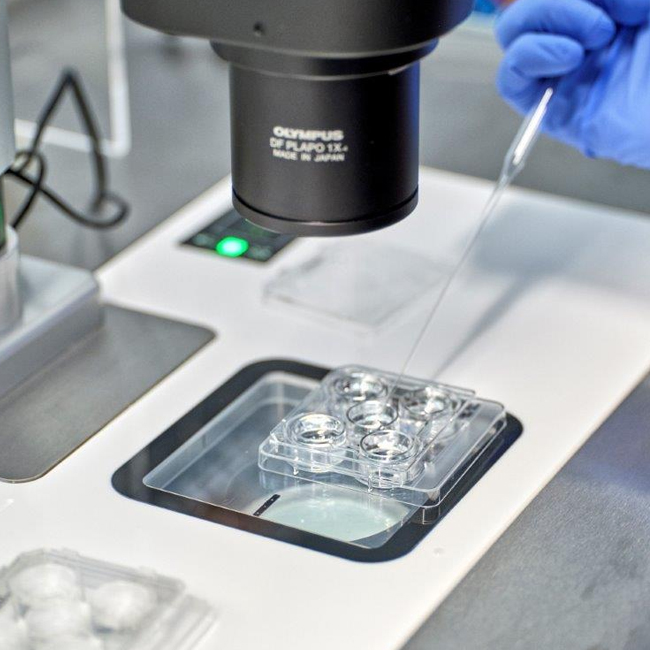
Supporting Your Fertility Journey
What Is IVF & Is It The Right Choice for You?
IVF stands for In Vitro Fertilisation, which means collecting eggs from the female partner and fertilizing them with sperm from the male partner outside the body (in vitro) in a controlled laboratory environment. The resulting embryo is then transferred back into the female uterus to achieve pregnancy.
Since its introduction in 1978, IVF has undergone significant advancements, becoming more efficient and extremely safe. However, it cannot fully overcome the natural decline in fertility that comes with age.
Initially, IVF was developed for women who had lost their fallopian tubes and were unable to conceive naturally. Over time, its applications have expanded to include:
Male Factor Infertility, including no sperm in the ejaculate (Azoospermia), low sperm count or poor sperm quality.
Unexplained Infertility, where no clear cause of infertility is identified.
Genetic Conditions, allowing for preimplantation genetic testing (PGT) to prevent the transmission of inherited disorders.
Recurrent Pregnancy Loss, where IVF with genetic screening may improve the chances of a successful pregnancy.
Ovulatory Disorders, such as polycystic ovary syndrome (PCOS) after unsuccessful ovulation induction or premature ovarian insufficiency requiring egg donation.
Severe Endometriosis, a condition where tissue similar to the lining of the uterus grows outside the uterus, affecting fertility.
Fertility Preservation, such as egg freezing for women undergoing medical treatments that may affect fertility or those wishing to delay childbearing.

You're unique so is your treatment
Your Step by Step Guide To The IVF Process
IVF involves seven important steps, all tailored to your specific needs and goals for building your family.
1. Personalised Treatment Plan
First, we will discuss and determine the best stimulation protocol for you. This is not a one-size-fits-all approach—every patient’s treatment is customized based on their medical history and how many children they would like to have.
2. Ovarian Stimulation & Monitoring
You will take daily hormone injections for about 9–12 days to stimulate your ovaries to produce multiple eggs.
Our trained nurse will guide you on how to administer these medications.
Additionally, you will take another medication to prevent premature ovulation, which varies depending on your specific protocol.
I personally perform all the monitoring of ultrasounds for my patients to ensure the best possible decisions are made at each step. Typically, you will have two ultrasounds, one around day 8 of your cycle and another around day 11.
Once your follicles are mature, we will give you a trigger injection to finalize egg maturation. There are four different trigger methods, and I will choose the best one for you
3. Egg Collection (Ovum Pick-Up)
About 36 hours after the trigger injection, we will perform the egg retrieval procedure in our specialized day surgery unit.
This is a quick, painless procedure done under light sedation, lasting around 20 minutes.
It is performed using a vaginal ultrasound-guided technique, just like your previous scans.
After the procedure, our embryologists will prepare your eggs for fertilization. If using fresh sperm, your partner will provide a sample on the same day. If frozen sperm is being used, it will be thawed and prepared for fertilization.
4. Fertilization
There are two main fertilization methods:
Standard IVF: If the sperm sample is normal, we mix about 100,000 sperm with each egg and allow natural fertilization.
ICSI (Intracytoplasmic Sperm Injection): If sperm quality is low (e.g., low count, low motility, or high abnormal forms), or if sperm was surgically retrieved, we select a single sperm and inject it directly into each mature egg.
ICSI is also used when genetic testing of embryos is planned.
5. Embryo Development & Selection
The fertilized eggs (embryos) are monitored in the lab using a time-lapse incubator, which allows us to observe their development without opening the incubator and exposing them to environmental changes.
By day 5 or 6, the best embryos are assessed using a standard grading system called the Gardner classification.
6. Embryo Transfer
If you are having a fresh embryo transfer, the best embryo is transferred into your uterus using ultrasound guidance.
You will also start progesterone support to help maintain the pregnancy.
7. Pregnancy Test & Follow-Up
When pregnancy is confirmed, you will have an ultrasound two weeks later to check the viability of the pregnancy.
Any extra good-quality embryos from this cycle will be frozen for future pregnancies.

Expert Care, Dedicated to Supporting You
Achieving the best outcomes requires precise care exactly when you need it.
How Successful is IVF?
The most important factor in determining the success of IVF and ultimately taking a baby home is the age of the female partner. The younger you are, the higher your chances of achieving pregnancy because egg quality naturally declines with age.
Another key factor is your egg reserve (the number of eggs available in your ovaries). If you are young but have a low egg reserve, you still have a good chance of success because younger eggs tend to be of higher quality.
However, you may produce fewer embryos, which means you may not have extra embryos available for freezing and future use.
Is IVF a Safe Procedure?
IVF is generally a very safe procedure. There are only two main risks associated with it:
1. Multiple Pregnancy
This used to be a concern when multiple embryos were transferred.
However, we now follow a single embryo transfer policy to significantly reduce this risk while maintaining high success rates.
2. Ovarian Hyperstimulation Syndrome (OHSS)
This condition occurs when the ovaries over-respond to stimulation medications. Thanks to advancements in treatment, the occurrence of OHSS has been reduced by half compared to before.
Under my care, I take all necessary precautions to completely prevent OHSS. The experience and careful judgment of your doctor are the most important factors in ensuring your safety, and I am fully equipped to manage your treatment in a way that eliminates this risk.
